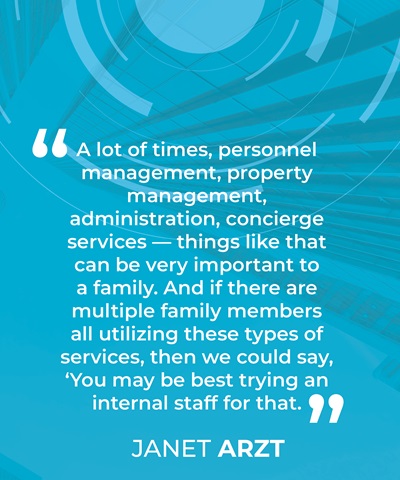Outsourcing some or all services is an increasingly common way for family offices to gain access to more specialized expertise. According to Deloitte Private’s Family Office Insights Series – Global Edition, 34% of family offices expect to increase their reliance on outsourcing to third parties this year. Only 7% expect a decrease in outsourcing.
But deciding which services to outsource — and to whom — can be tricky. Janet Arzt, founder and managing partner of Parere Advisory, works with family offices on these decisions, which she says are both qualitative — based on the family’s goals and desires — and quantitative, based on cost.
For example, she outlines the options for families considering outsourcing their investments: “A lot of families want control over the types of investments they’re making. They don’t want to go through third parties,” Arzt says. “We can say, if you insource, it could take three to six months to identify the hire, another three to six months to train them. And it’s probably going to cost about this much. Or you could outsource it, and it would cost about this much, and these would be the options.”
Arzt has worked with Samantha Thompson, the nonfamily director of a single-family office that represents the owner-operators of a commercial real estate portfolio, to coordinate with the operating company on setting up family office processes and procedures — including decisions about which services to bring in-house and which to outsource.
“When we think about how much we want to outsource, it’s really a balance,” Thompson says. “We don’t want to just turn something over and not have oversight. But at the same time, we weigh — in terms of our resources and our team — what makes the most sense in terms of the best use of someone’s time or skills.”
In Thompson’s case, part of the day-to-day responsibility of the family office is managing investments.
“We’ll work with some wealth managers, but we make the decisions ourselves in terms of what we actually want to invest in,” Thompson says. “We’re still building out more formal processes and looking at how we’re going to build an investment committee.”
The family office Thompson leads is relatively new, and one challenge is determining which of the legacy processes from the operating company should be kept and which should be changed.
“They have a fantastic team, but a family office is a different business than a commercial real estate company. So, part of looking at outsourcing is considering what the family office has been handling that, from a family office perspective, is slightly different,” Thompson says.
Another consideration: Is the workload consistent throughout the year?
“With something like accounting there are parts of the year where it’s very heavy, and you need a lot of accounting, but for other months of the year there’s not as much of that workload,” Thompson says. “There’s a lot of creative problem-solving in this field. The balance of keeping things in-house versus outsourcing is part of that problem-solving mindset. What are the resources that we have? What’s the best use of either our funds or our time? What’s the right team for us to have internally?”

Determining what should be done in-house
Sometimes the reason to bring a service in-house goes beyond just the numbers. It can also be about how much of a personal touch family members want.
“With some families, you can tell that there are certain aspects on the accounting front — cash management, bill pay, treasury — where they want to be able to pick up the phone all hours of the day and really know that one person can tell them, ‘This is currently how much you have in these bank accounts,’ and how to access it without going through a third party. That’s really important to them. That is going to be an in-house staff,” Arzt says. “A lot of times, personnel management, property management, administration, concierge services — things like that can be very important to a family. And if there are multiple family members all utilizing these types of services, then we could say, ‘You may be best trying an internal staff for that.’”
On the other hand, some functions require numerous specialists and could be difficult to staff in-house, Thompson says.
“Accounting is the area that is probably the most outsourced just because it is so complex, and we have to work closely with the operating company’s accounting staff and outside accountants,” Thompson says. “Parts of the accounting piece, like tax accounting and preparation, I think would be outsourced long term. Things can change — it’s a dynamic industry — but I don’t envision us really building out a full tax team, because I think there are really good providers out there. Some offer more than just tax accounting, like advisory services. And for us to bring that in-house, we would need a lot of people.”

An evolving solution
Whether to outsource or insource is not just a yes or no decision.
For example, Thompson is an attorney, but not a specialist in trusts and estates. So she envisions continuing to work with outside experts in that area.
“I think, ideally, we will have eyes on pretty much everything internally, but working in partnership with a third party,” Thompson says. “I’m not a trust and estates attorney, so we don’t have anyone who has that deep subject matter expertise on staff. We would work in partnership with law firms.”
And as the family office adjusts to the family’s changing needs, the balance of outsourced vs. in-house services will likely also change.
“Because we are in this nascent phase, we are probably outsourcing a little bit more than we will long term,” Thompson says. “But it will always be a balance of: What is the external cost? What are we getting for that cost? When we look at something like accounting, for example, is it just accounting, or is it more of an advisory service with strategic planning? Then we’re getting more than we would with just bringing in one person.”



